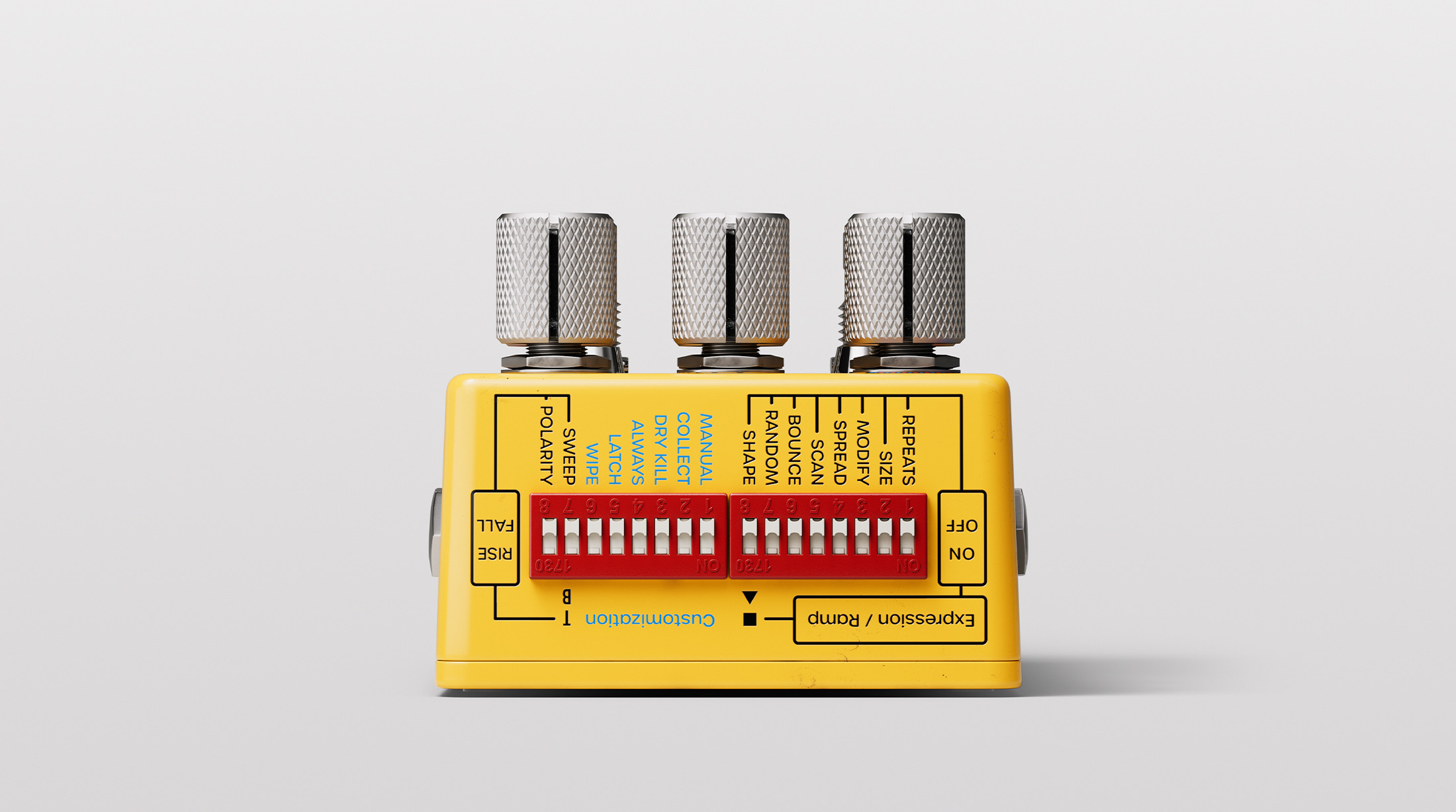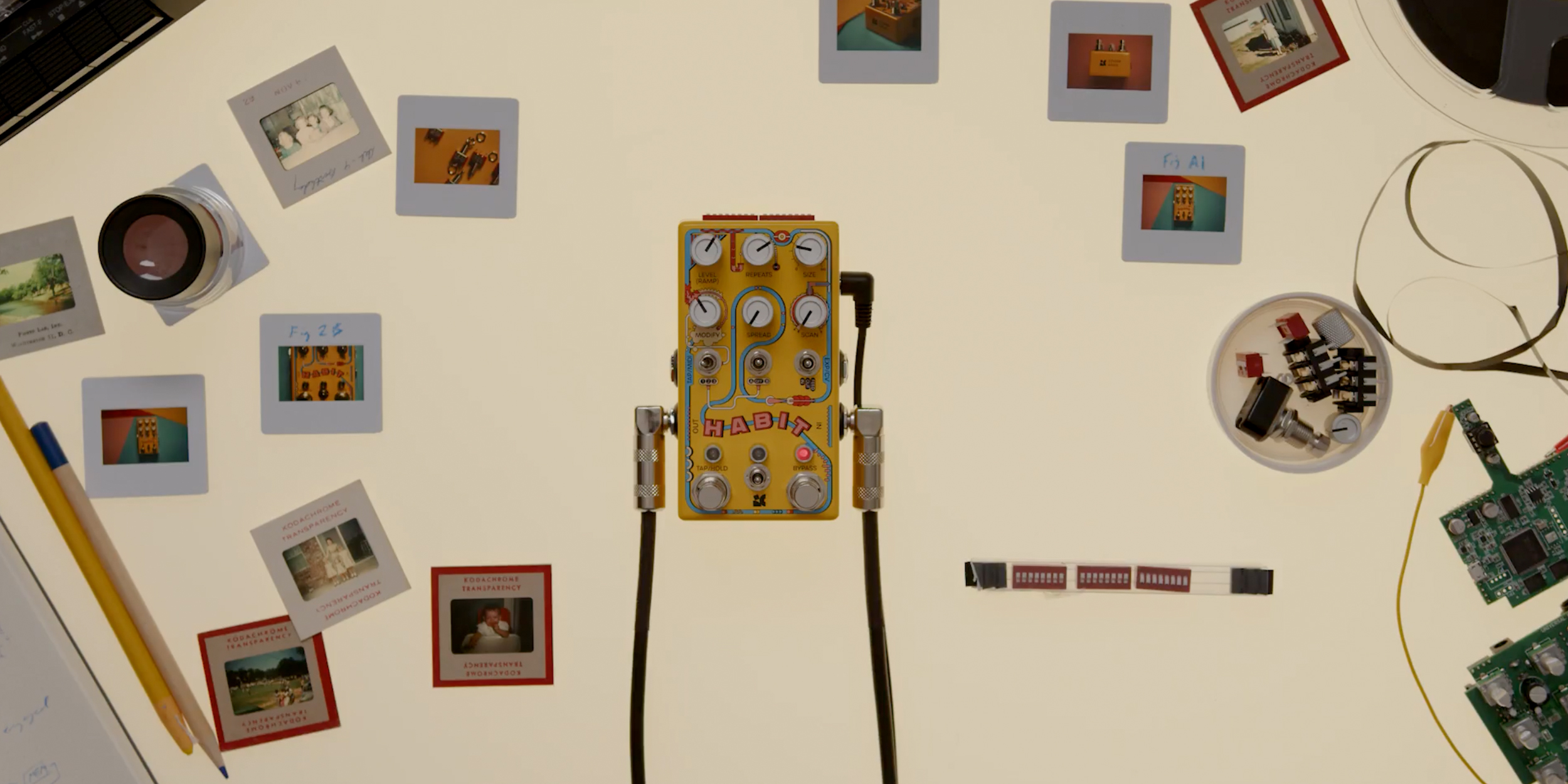Habit
Echo Collector
Musical sketchpad. Compositional delay.
Habit is a delay with a memory. It stores everything you play for later, so you can revisit and reuse sounds from the past: Gather up loops, design echo patterns, and harmonize with yourself from two minutes ago.
It’s an effect that can be turned into an instrument on a whim, an evolving paint-splatter of everything you do. Or it could just be a fun echo. How is Habit different from MOOD? Or blooper? Click here to find out.
Use Habit’s interconnected machinery to design new rhythms and patterns.
Shape your echoes with two banks of modifiers.
Scan freely through the memory, or let Habit do it for you.
Collect free-form compositions by simply playing into the pedal.
Scanning.
Moments from the past.
Habit’s secret is a digital tape reel that records every sound that enters the pedal. As long as Habit is on, it’s recording.
At any moment, you can scan back into this history and play moments from the past–instead of, or alongside the present. This architecture makes a pile of interesting things possible: never-before-heard delays, bizarre loops and transitions, and even entire songs captured right inside the pedal.
60-second delay
We’ve tossed a whole lot of echo into Habit. Frippertronics, loop generation, and the ability to create glacially evolving scenes–a sampling of what you can get up to with all that delay.
Secondary echoes
Turn up the Spread control to listen to two moments at once. This is the key to Habit’s multi-tap abilities, but can also get into some wild cognitive dissonance. Echoes of the past and present, playing side-by-side.
Modifiers
Trim, filter and etc. your echoes into any shape you wish with Habit’s flexible modifiers.
+ Tape delay
+ Dissolving echoes
+ Shrinking subdivisions
+ More more more
Collecting.
A new kind of workflow.
Habit’s compositional side introduces a new kind of workflow, like a free-form sampler. You can build loops by navigating the memory, picking out and combining various moments from the past. Or set the memory to overdub so that long-form songs emerge just by playing into it.
You can even send the output audio right back into the input in Feed mode to record your live effects processing and knob changes to memory.

Expand and integrate
Habit features advanced connectivity and customization options including MIDI, CV and Expression control, sync, presets, and internal modulation of any or all its knobs.
Downloads
Specs
Mono I/O
Presets (2)
Internal modulation (Ramping)
MIDI (PC, CC and Clock)
CV control
Expression control
External tap
Tap tempo
Analog dry thru
Buffered bypass
9VDC Center Negative ~150 mA
-
My pedal is on but I'm not hearing any effect?
It's probably the Scan knob. If the Manual dipswitch is on and Scan is turned up, you're telling Habit to echo something from the memory – but you just turned the pedal on, so there's nothing there yet. In Manual mode, set Scan quite low until you play for a while, then turn it up and start exploring.
Why am I hearing sounds that I'm not playing?
This can happen for two reasons:The Collect dip is on.
You have Spread or Scan turned up.
Both are intended behavior.
What can I do with the USB jack
Habit's USB jack is only intended for firmware updates and bug fixes. There are no current plans to add additional features or user customization.
Why am I getting distortion?
Because Habit lets you pile up sounds infinitely, you will eventually reach a volume where things start to clip. This moment will come sooner if you use louder instruments like synths and drum machines. Sometimes that distortion can sound good, but a helpful tip for managing it is putting Habit on a send: Lower the volume going into the pedal, then boost it back up on the way out.
Why am I hearing dry mixed in with the modifiers?
This will happen if you have Memory Dry set to the On or Scanning positions. You're hearing the audio from the memory directly, like another clean signal mixed in alongside the echo. See pg. 42 of the manual for your other options, and how to change it.
How is Habit different from MOOD? Or blooper?
We thought this might happen. So we created a breakdown of the difference between Habit, blooper, and MOOD. Click here to read it.









